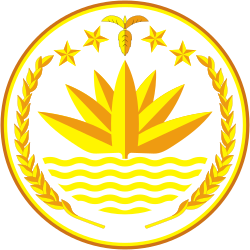Do you have confidence in President Major General Ziaur Rahman and the policies and programs adopted by him? | ||||||||||||||||||||||
| Results | ||||||||||||||||||||||
|---|---|---|---|---|---|---|---|---|---|---|---|---|---|---|---|---|---|---|---|---|---|---|
| ||||||||||||||||||||||
 |
|---|
A national vote of confidence on President Ziaur Rahman was held in Bangladesh on 30 May 1977. [1] [2] Voters were asked, "Do you have confidence in President Major General Ziaur Rahman and the policies and programs adopted by him?". President Zia won a overwhelming victory in the referendum [3] [4] as the result saw 98.9% of votes saying yes, with a voter turnout of 88.1%. [5]


